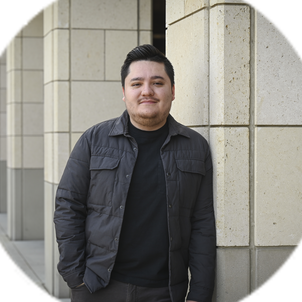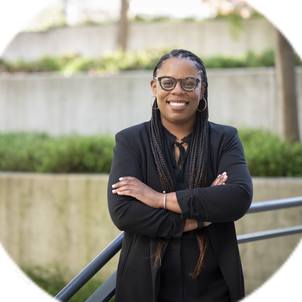When I was a student, I was eager to be appreciated as a complete human being. That idea has become central to how I approach my work as Assistant Director for Graduate Outreach & Recruitment and Director of the School of Engineering’s Summer Undergraduate Research Fellowship (SURF) program.
I was hired in January of 2022 and immediately began planning for SURF. Last summer, the program brought 30 undergraduate students from around the world to Stanford for an immersive, high-caliber eight-week research experience in a Stanford Engineering lab. As program director, my role is to support our students not only in their research, but also in their preparation to advocate for themselves as they confront imposter syndrome or face challenges in their labs.
I recently completed my PhD in Modern Thought and Literature at Stanford and a lot of skills that I learned as a doctoral student – empathy, attention to detail, and faith in the imagination, for example – really come in handy in my current job. The transition to this role also felt seamless because I had already been doing outreach work with communities of color as a graduate student. For the last three years of my PhD, I lived in Stanford’s Latinx-themed undergraduate dorm called Casa Zapata. My duties were heavily focused on mentorship – academic, personal, and emotional. There were a lot of opportunities for me to help students understand what the path from undergrad to graduate school might look like for them.
I’m all about connection; but I believe in ethical connection and ethical outreach, meaning I want students who come to Stanford to be seen as their whole selves. Though, unfortunately, institutional change is slow, by recognizing that very capable, highly intelligent human beings also need systems that tend to them with care and respect, we can make Stanford a place where we all thrive. That’s my goal: to treat people in a way that makes them feel like they belong at Stanford. I had people and even books that helped me feel that way. Reading Audre Lorde’s poetry and theory, particularly her book Sister Outsider, during my time at Stanford gave me the feeling that Lorde was making space for me within academia.
It’s my hope that my work also helps create space for others. After participating in SURF, almost every student reports increased interest in pursuing graduate work in engineering. These students could change the face, quite literally, of what Stanford Engineering looks like. Their perspectives, values, and experiences have powerful potential to transform the future of engineering in a positive way, and it’s really exciting for me to support them in getting here.
Related spotlights

Lara Weed

Sebastian Fernández

